Related Research Articles
Yoo Young-chul is a South Korean serial killer, sex offender, and self-confessed cannibal. After he admitted to the murders of multiple people, mostly prostitutes and wealthy old women, the Seoul Central District Court convicted him of 20 murders, although one case was dismissed when it was identified as being committed by another serial killer, Jeong Nam-gyu. Yoo burned three and mutilated at least 11 of his victims and admitted that he ate the livers of some of them. He committed his crimes between September 2003 to July 2004 and was apprehended on 15 July 2004. Yoo explained his motives in front of a TV camera saying "Women shouldn't be sluts, and the rich should know what they've done."

Memories of Murder is a 2003 South Korean neo-noir crime thriller film directed by Bong Joon-ho, from a screenplay by Bong and Shim Sung-bo, and based on the 1996 play Come to See Me by Kim Kwang-rim. It stars Song Kang-ho and Kim Sang-kyung. In the film, detectives Park Doo-man (Song) and Seo Tae-yoon (Kim) lead an investigation into a string of rapes and murders taking place in Hwaseong in the late 1980s.
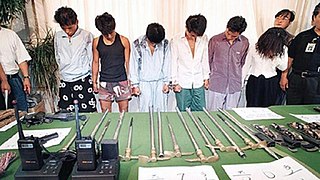
The Chijon Family (Korean: 지존파); or Jijon Family) was a South Korean gang active between 1993 and 1994. The gang was founded by Kim Gi-hwan, a former convict, and six other former prisoners and unemployed workers who shared his grudge against the rich. 'Chijon' is a name given to the gang by prosecutors working on the case — Kim had originally named his gang the Mascan, apparently believing the word to be of Greek origin and to signify 'ambition', though no Greek word of similar meaning and pronunciation can be identified.

Lee Chun-jae is a South Korean serial killer known for committing the Hwaseong serial murders. Between 1986 and 1994, Lee murdered fifteen women and girls in addition to committing numerous sexual assaults, predominantly in Hwaseong, Gyeonggi Province, and the surrounding areas. The murders, which remained unsolved for thirty years, are considered to be the most infamous in modern South Korean history and were the inspiration for the 2003 film Memories of Murder.
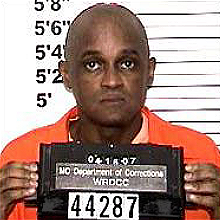
Lorenzo Jerome Gilyard, Jr., known as the Kansas City Strangler, is an American serial killer. A former trash-company supervisor, Gilyard is believed to have raped and murdered at least 13 women and girls from 1977 to 1993. He was convicted of six counts of murder on March 16, 2007.

Carlton Michael Gary was an American serial killer who murdered three elderly women in Columbus, Georgia, and one in Syracuse, New York, between 1975 and 1978, though he is suspected of at least four more killings. Gary was arrested in December 1978 for an armed robbery and sentenced to 21 years in prison. He escaped from custody in 1983 and was caught a year later. Evidence was found linking him to the earlier murders and he was convicted and sentenced to death in August 1986. He was executed by lethal injection on March 15, 2018.
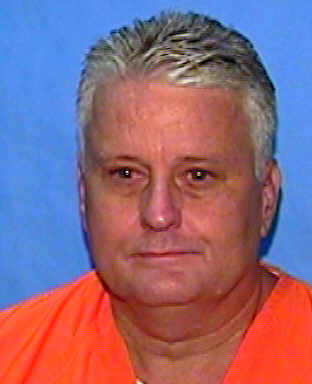
Robert Joseph "Bobby Joe" Long was an American serial killer and rapist who was executed by the state of Florida for the murder of Michelle Denise Simms. Long abducted, sexually assaulted, and murdered at least ten women in the Tampa Bay area in Florida during an eight-month period in 1984. He released 17-year-old Lisa McVey after 26 hours. McVey provided critical information to the police that enabled them to arrest Long.

Rainbow Eyes is a 2007 South Korean crime thriller film directed by Yang Yun-ho. The story follows a police inspector who discovers that his friend is now a serial killer. The movie was remade into a Thailand thriller named 'Cheun'.
The Cho Doo-soon case refers to an assault that took place in Ansan, South-Korea, in December 2008, in which an eight-year-old girl known only as Na-young was kidnapped and raped by Cho Doo-soon, a 57-year-old male, in a bathroom inside a church. This severely damaged the victim's body. Cho was sentenced to 12 years in prison, and appealed on the grounds that the sentence was harsh, but his appeals were rejected. The sentence was later reduced because the criminal was old and claimed he was drunk, and his mental and physical weakness was recognized. The case sparked outrage and protests involving Na-young's parents and many others.

Missing You is a 2012 South Korean television series starring Yoon Eun-hye, Park Yoo-chun, and Yoo Seung-ho. It aired on MBC from November 7, 2012 to January 17, 2013 on Wednesdays and Thursdays at 21:55 for 21 episodes.

Hope, also known as Wish, is a 2013 South Korean drama film directed by Lee Joon-ik, starring Sol Kyung-gu, Uhm Ji-won and Lee Re. It won Best Film at the 34th Blue Dragon Film Awards.
Kang Ho-sun is a South Korean serial killer who was sentenced to death in 2010 for killing 10 women between October 2005 and December 2008, including his wife and her mother.

Hae Min Lee was a Korean-American high school student who went missing on January 13, 1999, in Baltimore County, Maryland, before turning up dead on February 9, 1999, when her corpse was discovered in Leakin Park, Baltimore. Her autopsy revealed that she had been killed by way of manual strangulation.
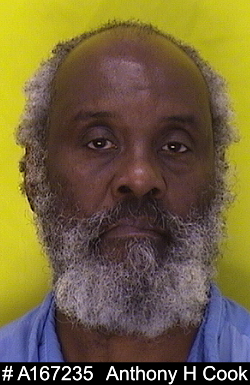
Anthony Cook and Nathaniel Cook are American serial killer brothers who committed a series of at least 9 rapes and murders of mostly couples in Toledo, Ohio, area between 1973 and 1981. Their guilt was established in the late 1990s thanks to DNA profiling, after which both brothers were convicted and sentenced to long terms of imprisonment.

Dark Figure of Crime is a 2018 South Korean crime drama film directed by Kim Tae-kyun. It stars Kim Yoon-seok and Ju Ji-hoon. It was released on October 3, 2018. The film was loosely inspired by the 869th episode of Unanswered, a South Korean investigation television program, which tells a real story that happened in Busan, where murders were never reported, bodies were never found, and investigations never happened.
Jeong Du-yeong is a South Korean serial killer who killed 9 people from June 1999 to April 2000.

The Jung Joon-young KakaoTalk chatrooms was a South Korean entertainment and sex scandal publicized in 2019 as part of the Burning Sun scandal. The two scandals were tied together by the release of revealing KakaoTalk messages that exposed alleged crimes at the Burning Sun nightclub, and separately, by K-pop singer and entertainer Jung Joon-young and his friends and colleagues.
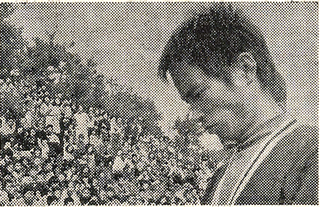
Kim Dae-doo was a South Korean serial killer who killed 17 people during a 55-day killing spree from August to October 1975. Kim was considered as one of the worst and most prolific criminals in South Korea's history, and he was executed for his crimes in 1976.
Ahn Nam-gi is a South Korean serial killer and rapist who was convicted of raping and killing at least three women in Cheongju from 2004 and 2010, while he worked as a taxi driver. Initially sentenced to death, his sentence was later commuted to life imprisonment, which he is currently serving at Chungju Prison.
Kang Chang-gu was a South Korean serial killer and rapist responsible for the murders of six women in Gongju and the surrounding area from 1983 to 1987, committed out of his self-described misogynistic beliefs. Convicted and sentenced to death for these crimes, he was subsequently hanged in 1990.
References
- ↑ 어이없고 해괴한 범죄 `사이코패시`족들!
- ↑ 꽃다운 소녀 허벅지 베어 먹은 '인간 포식자' [ permanent dead link ]
- ↑ [한국의 과학수사]고창 연쇄살인 사건 -일명 김해선 사건] [[Korea Scientific Investigation] Gochang serial murder case-also known as Kim Hae-seon case]. Naeil Shinmun (in Korean). July 30, 2010. Archived from the original on September 14, 2012. Retrieved August 28, 2018.